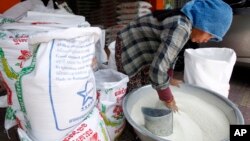The Cambodian Agriculture Ministry rejected criticism circulating on social media about farmers getting low prices for their rice in the paddy-producing provinces of Battambang, Pursat and Banteay Meanchey.
The ministry released a statement on Tuesday claiming that farmers receiving low rice prices were selling poor quality rice and that prices were still within an acceptable range. Ministry officials were also working with rice mills to procure as much rice as possible from farmers.
The claims of low prices, the ministry said, were “far from the truth” and that the ministry was ensuring that farmers’ paddy was purchased and at fair prices.
“Actually, the ministry has been taking continuous action [on the issue], but some Facebook users published the old information, which is why the ministry had to issue a statement to inform the public,” said Chan Heng, the ministry’s deputy cabinet director.
Following the wet season, farmers have complained about low rice prices and have even been asked to not plant a dry season crop on account of very low water levels across the country.
Chan Sokheang, deputy director of Cambodia Rice Federation, said that prices were still within reasonable levels.
“The price for [certain] quality of rice is different from last year…but the price is not different [for all rice] compared to last year,” Chan Sokheang said.
However, Yaing Saing Koma, an agricultural expert, said that rice prices were low mainly because rice export to European Union is declining.
The rice export to the EU has dropped from around 170,000 tons in 2018 to 120,000 tons in 2019 for the first eight months, according to representatives of rice millers. The rice sector was also hit with tariffs for exports to the European Union earlier this year, after Italy triggered safeguard mechanisms.
“The rice exports to the EU are dropping badly so it affects the profit of the rice milling companies. They are afraid to stock a lot of rice for export,” he said.
Earlier this month, the Cambodia Rice Federation said it needed $200 million in working capital to buy rice from the farmers on account of shrinking loans available in the financial sector, with government allocating only $50 million of the required capital.







